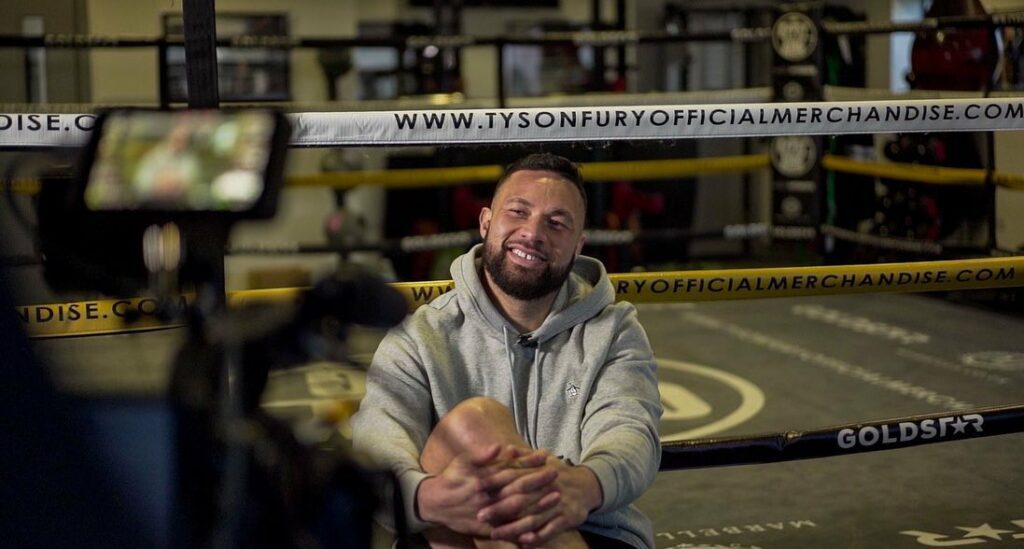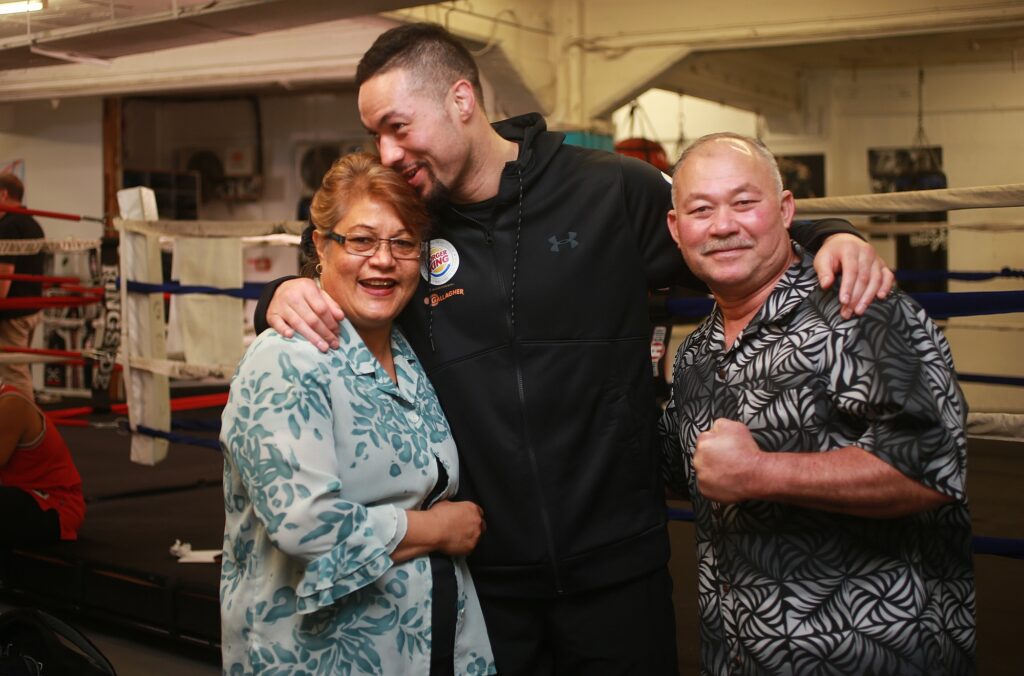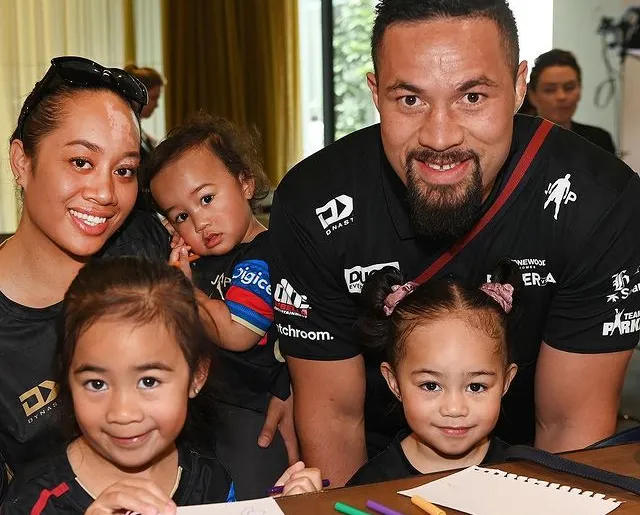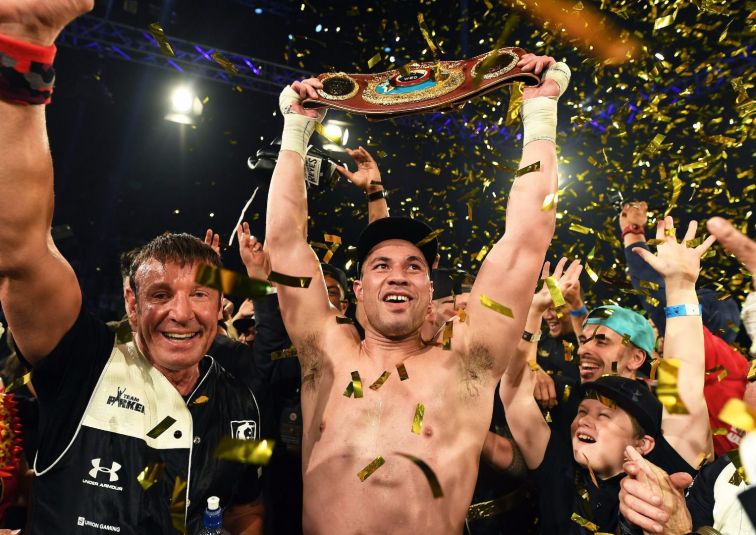Joseph Parker shares how planning can save you in the ring and life
One of the most famous quotes about boxing – and about life – is from Mike Tyson. “Everybody’s got a plan until you get punched in the face.” One man who knows a lot about this is boxer Joseph Parker. He talks to Wellbeings about how planning is one of his top tools – both in and out of the ring – but how to adjust when things don’t change quickly (see above!)

When things are not going the way that you want them to, what do you do?
For me, personally, it’s having different plans in place. If one plan doesn’t work, you’ve got another plan that you can fall on. If that one doesn’t work, you have another plan, similar to when you’re fighting, if you’re going to a fight, and it’s not going your way, you always have to have a plan B, plan C, Plan D, and the list goes on. So as always having been prepared, if it doesn’t go your way.
I want to quickly talk about mindset. What are the things or tricks that you’ve learned to help you get in flow?
Mindset for me is like right now, going into camp: I have the best environment, I have the best training, a nutritionist, and a strength and conditioning trainer. I’ve got a good environment, good people around me, and that all adds to the mindset going into a fight.
For me, mindset is the preparation that you do that prepares you for going into battle. I’ve also got a psychologist that I work with once a week and talk to and open up with and he simplifies a lot of things and makes it easy for me to understand. And when I go into battle, I’m clear-headed. There’s nothing much in there, just my brain.
When you think about yourself as a young athlete, what do you think now about some of the struggles you faced back then?
When I look back now, there are a lot of things I want to tell my younger self: how to do this, how to do that, work with this person, work with that person, go to bed on time, eat clean, this and that there’s a lot of things I want to tell. But now that I’m here, and at this age, I feel like I got everything as right as I can get it. And, you know, there’s been a lot of learning along the way.
When you think of the younger you, as a 15 year old kid, could you have ever imagined that you’d be where you are now?
I’ve always believed I was going to be world champion. My dad always believed that I was going to be world champion. I didn’t know when, I didn’t know how, but I always believed it. And it came earlier than I expected. The younger me, no, I did train hard. I travelled the world and I fought all over the world as an amateur and got different medals representing New Zealand. But there was a part of me, the younger me, that didn’t focus, didn’t train, that went out and partied, that went out and had fun. And if I could reverse back, you know, I’ll tell the younger me just to stay focused. I mean, I wouldn’t change anything because everything happens for a reason. But when you do look back, it’s interesting what you go through as a young person, leading to what you’re now.
I want to ask about your dad; what kind of belief does a father have to have to be helping you believe you could be number one, and how important is support in anyone’s journey?
If it wasn’t for my parents’ support, I wouldn’t be where I am today. The belief that my father had in me, is like – I don’t know if I’ve even seen it in other fathers that have athletes as children! But his belief in me was telling everyone around us, our family and friends, when I was three years old, that I was going to be a world champion. And he didn’t know if I was going to be tall, if I was going to be strong, if I was going to be any good at boxing but he always said that I was going to be world champion from the age of three. That belief is next level.

How does that impact how you now show up as a father?
Just him having that belief and having that sort of faith and just giving everything he could in my life, (for me) to be a good boxer and a good fighter and a good athlete… It shows me that I can do the same to my children and be that kind of father for them.
I know that there’s a lot of dads that look up to you; what advice would you share on how to show up for the kids?
Time. Time is everything you got, when I do get the opportunity to spend time with my kids, I give 100% effort. Whatever it is, whether it’s drawing, whether it’s playing outside, whether it’s on a playground, whether it’s going out doing this and doing that, I give 100% of my time to my kids. And I can see how close we are as a family because every time I leave to go overseas for training camp, my kids cry, and they dread the day that I leave. And I feel like because we have such a close relationship, and I give them time, you can see why it’s so hard for me to leave.

How much is this sacrifice one of the biggest challenges of what you do?
The hardest thing about boxing is the sacrifice of leaving your family, leaving your kids, leaving your wife. It’s sad to say, but I haven’t been to any of the births of my children because of boxing, because of the sacrifice of being away for camp, working towards a fight, training hard and trying to, you know, work hard for my family. But my kids, hopefully one day they understand, or they do understand, that this boxing is not going to be forever. And I’m only doing this for another four, five years. And hopefully they’re proud of me when they grow up and realise what I’ve been able to do for our family.
You’re travelling all around the world, and sleep is the big thing and making sure you’re getting the right nutrients in, the right movement etc. How do you stay consistent when you’re travelling so much?
It comes back to the mindset. My mindset now is to stay active and stay ready. My body is what I need for work, and if I eat bad food, if I don’t train, and if I don’t work out, I’m not doing any favours for myself when it comes to fighting, when it comes to camp. It’s very important for me, even though I’m travelling, if it’s Vegas, if it’s the UK, if it’s Dubai, I’m always in a gym, I’m always trying my best to eat clean. And that comes back to the mindset, mindset is everything. And my mindset now is, I want to give everything I can to boxing for the remainder of the time I have. Four, five years: give it everything I have. And when I leave the sport, I’m not going to turn back and say I wish I did this and I wish I did that. I’m doing it now.
Tell us about some of the guilty pleasures that you do allow yourself every now and then.
I slip up many times. I went ahead, ate chocolate. I had it, my family was there with me. In the UK. I had doughnuts, I had sushi. I had this, I had that, but as long as I stuck to the program as best I could, I was able to have these slip-ups. And you know we’re all human and these slip-ups are nice [Laughs].
Any New Zealand sweets you crave when you’re overseas?
I love New Zealand chocolate. I do like Pineapple Lumps as well, and most of all seafood. New Zealand has some of the best seafood. In the UK you can’t really find seafood like New Zealand seafood.
You’re such a great communicator and sometimes as an athlete, that can be really tough. How hard have you had to work on being able to speak your truth?
Very hard. Because in the beginning of your career, you’re shy, you’re nervous, and you don’t really have the confidence within yourself. But I think, as time goes on, and as you progress as a fighter, as a person, as a father, as a son, you start having more confidence within yourself and you can open up, and you can tell others about who you are, and why you do this, and why you do that, and the person that you have become.

You’ve worked with Tyson Fury a lot. Tell us about the man that you know, and also what you’ve learned from him.
Tyson for me is, he’s like an older brother; he’s very generous. I moved over to the UK last year of March 2021 for training camp, and when I got there, he gave me his house, and he said, “live in this”, you know, and I said, “how much?” And he goes, “for free”. And then, he gave me his strength coaches, massage therapists, gave me his gym, gave me all the contacts he had. And he said, use this and be the best fighter you can be. He’s for me, a very generous person, like an older brother. We have a great relationship, and I’m very thankful to have someone like that to support me and back me and help me.
How do you pick yourself up, especially when the New Zealand’s media, everyone is coming down on you. Talk about the lowest point for you in your career, as you look back
As I look back at my career, the lowest point would be after becoming world champion. In 2016 I became world champion, and everyone thought that was the best feeling. There was the dream, I ticked that box. But after being world champion, I went through exactly the same thing that Tyson Fury went through, the only difference, his one was public, and mine was kept under the radar. Lucky I have a great support team behind me. But the lowest point was 2017. Even though I was fighting, I was fighting at 20% or at 10%, because I wasn’t taking it seriously.
Over the last couple of years, the words that you hear come up a lot: anxiety, overwhelm, burnout. It’s powerful to know that someone like you has those feelings. Do you relate to what everyone’s been going through?
I can relate to a lot of people and what they’ve been going through, because I’m a human being myself, and I’m just a normal person myself. The only difference is I do boxing, and it’s on a world stage. But I’m like everyone else, we have downfalls.
When you talk about being on the world stage, and then you lose, or you didn’t get the result that you wanted. How do you pick yourself up?
I don’t call it losing, I call it learning. And even though I’ve lost twice on the world stage, I’ve taken those fights, and I’ve learned from it big time. And it took me a while to make changes within myself and my team, but I’ve made the changes and I’ve seen the positive impact that it’s made on my career. I can look back at those fights now and say, “if I fight those guys, again, it’ll be a different result”.
I guess one of the big conversations, especially as men in New Zealand, is vulnerability. When you talk about the media and the press scrutiny of any athlete, how do you take that and continue to want to do what you do and not just throw in the towel?
Listen, as long as I have a goal – and my goal is to be champion of the world again, two-time world champion – the media can play a big part in your life, good and bad. They can bring you down, they can say this, they can say that, but as long as you have your focus, and as long as you have your support team, as long as you know what drives you to be the best, then all of this stuff is just noise and isn’t important to you. They can say whatever they want about me. I don’t really care because I know exactly who I am as a person. I have my parents support me, I’ve got my siblings, I have my wife and my kids, and that’s all that matters.
Q.
When people come up to you on the street, you’re an inspiring figure. What do they say to you? What does that support feel like, from just the general public?
A.
The support is amazing. And I still feel sort of like nervous talking to people, but then people come up to me and say, “great work”, “the last fight was awesome”, “we’re supporting you to be champion”, and honestly, the support is next level, and without the support, again, without the support my parents and support of the public and everyone around me, I wouldn’t be where I am.
Q.
It’s kind of like how 10 people can say something good, then one person says something bad, and you can’t stop thinking about that one negative thing. I’m sure as a young fighter, that was probably harder for you. How do you overcome that? And what was that like back then?
A.
Yeah, when someone says something you don’t like, as a younger person, as the younger fighter that I was, it did affect me, because I was like, why does this person not like me? Why is he saying these bad things about me? And you try and you try and change their minds, and you’re focusing on trying to make that one person talk better about you. But now, I’m just like, everyone has an opinion, and everyone can say this and say that, but as long as you have your focus in what you want to achieve, then it’s just all noise. Good noise, bad noise, whatever it is, it’s just noise.
Q.
The things that you’ve learned, the different modalities, whether it’s ice baths, whether it’s saunas, whether it’s how to get good sleep, training, give me some advice, Joe? Like, what are the things that you do that you would advise for us all?
A.
For me, the most important thing that I’ve learned recently is that eating is key. The food that you put in your body is what you get out of it energy wise.
Training, I used to train so hard and so much that I always burned myself out. It’s about training smart, it’s not training hard but training smart. Training for a shorter period of time, but more intense.
And then sleep, I think that you should get a lot of sleep, because sleep is very important to recovery, it’s just as important as training and just as important as eating.
All of them make a complete package. And for the recovery, I do a lot of saunas, I do a lot of ice baths because I’m getting my body ready for the next session and ready for the next day.
Q.
I’m sure when you were younger, there was a lot of stuff you didn’t know about that you know about now. How did you get to sample it all? How did you first try ice baths?
A.
It’s about learning from everyone, and about learning from others and their experiences. I had a lot of people influence me on trying the ice bath. And when I did try, I felt a big difference, ice bath and sauna. I felt like it was very beneficial for my body. I wasn’t as sore the next day and I was able to push more, and more because I was able to, my body was able to take all the training that was being given.
Q.
There’s a lot of young men and women that look up to Joe Parker, who does Joe Parker look up to?
A.
I look up to my father, my parents, but mostly my dad, because he showed me how to work hard from a young age. And he taught me many things, like fishing, taught me how to fix a car, to change a tire, taught me how to drive when I was young. He taught me a lot of things as a young boy and he is my hero.
Q.
No matter what happens, he’s still going to be so proud of you. When is the moment when you’ve felt his love the most when it comes to boxing? What was that moment when he sort of said to his son, you’ve done a great thing here and I’m so proud of you.
A.
It was winning the World Title, because that was a dream of his and mine. It was a dream together. And when I won the World Title, he was very proud dad, a happy dad. And you know, a lot of people showed him more respect because of what I’ve been able to achieve, and that was a very proud moment for him.
Q.
How important has your mum also been on the journey of Joe Parker?
A.
My mom is my favourite person in the world. I love my mom with all my heart and she is another reason why I do what I do. I know every kid out there will say their mom is the best, but my mom is the absolute best, and I love my mom with all my heart.
Q.
Well, man, it’s a real honour to sit here with you. But what I like about you the most is that you are really approachable and you’re so easy to support. And we all want to see you do well! So, what would you want to say to the New Zealand public as you go after this mission, because I can tell the resilience and the strength that you have is something you’ve never had before, and we’re really excited about it.
A.
You know, as a fighter, throughout my career, I’ve become world champion, but I wasn’t doing everything right. And I didn’t have the proper mindset. I did have a good team, but I didn’t have the best team. Now, as I go into trying to fight for the world title again, I have no doubt that I can be champion of the world again. And for me, I just want to say thanks to the public, first for their support from the beginning, because without them, I wouldn’t be where I am today. I hope and pray that they continue to support me because I’m gonna be out there, you know, representing our country the best I can, and I’m gonna give it everything I have for the time that I have in boxing.
Q.
How much has the journey that you’ve been on served you as a man? After boxing, all the resilience and the mindset training that you’ve done, how has that helped you become a better human as well?
A.
Oh, it’s helped me tremendously be a better human, be a better father, be a better son. And it’s taught me humility, it’s taught me respect, it’s taught me to honour my parents, it has taught me a lot of things. And I think after boxing, my goal is to give back, I want to give back, whether it’s to fighters, whether it’s to other athletes, whether it’s to, I don’t know, giving back to the poor, I don’t know, there’s so many things I want to do. But I just got to make a plan for after boxing. And if I go for it, I’m gonna achieve it.
Q.
We’re excited to see where that goes. There’s a lot of people out there right now listening, that are going through it, going through something, not only in the last couple of years, but just in general: depression, anxiety, people are very stressed. And as someone who has overcome, and has that mindset training, what would you say to someone who is really struggling at this moment?
A.
What I would say is, don’t keep it within yourself, but speak up. The power does come from within yourself. So if you really want to change, and if you really want to get past what you’re going through, and if you really want help, you have the ability to do that. And you have the ability to change what you’re going through. It all comes down to you. But there’s a lot of people around that support you, that love you. Speak up.
Q.
You’ve spoken so well on community and support, and as we are a community, we need to be connected. We’re all in this together, we’re all going through something, so I think the one thing I would also say i, you can look to others to support you. When you’re down, others are there to lift you up, right?
A>
Others are always going to be there to lift you up. So never have doubt and never be scared. Because we’re all here as a team and as a community.
Q.
Well brother, gratitude is always how we end every interview. So what are you grateful for right now?
A.
I’m grateful for the opportunity to be here. I’m grateful for the community that we have, for everyone that showed up. And I’m grateful for this beautiful day.

